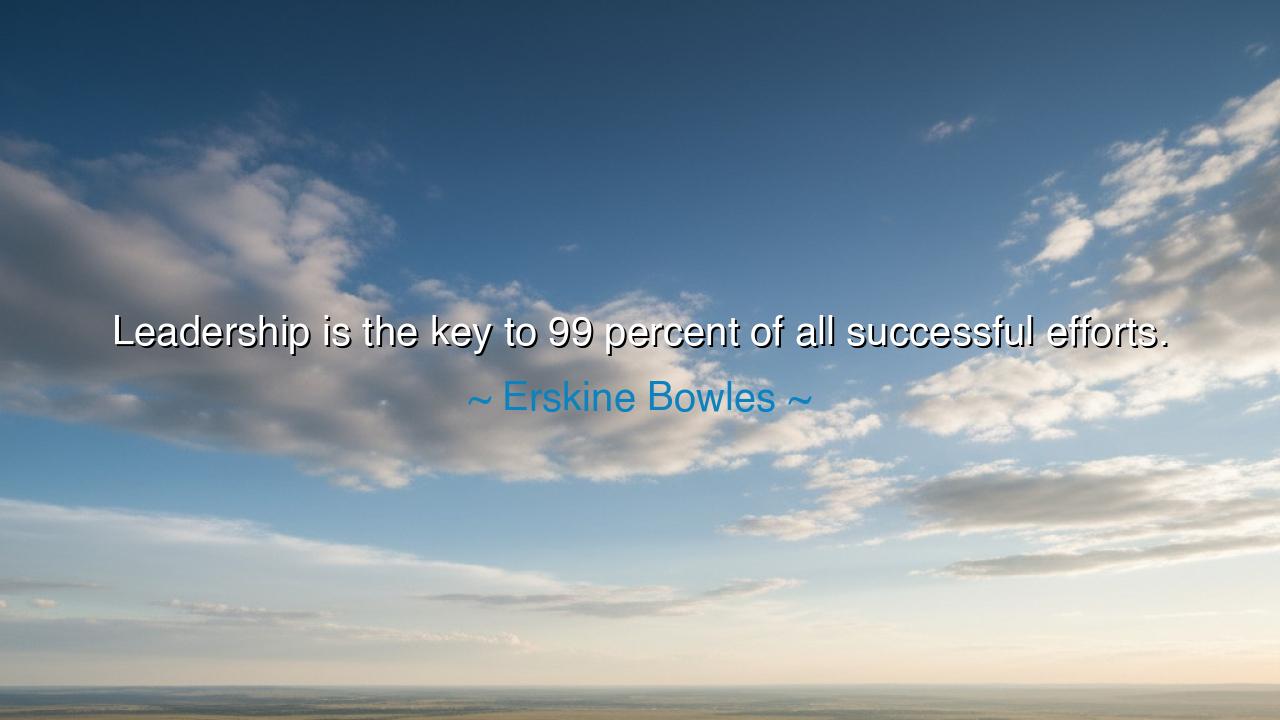
Leadership is the key to 99 percent of all successful efforts.






The words of Erskine Bowles ring with the resonance of truth earned through experience: “Leadership is the key to 99 percent of all successful efforts.” Simple though they may appear, these words hold the distilled wisdom of a lifetime spent guiding great endeavors and witnessing the power—and the absence—of leadership in action. Bowles, a statesman, businessman, and public servant, speaks here not as a philosopher in abstraction, but as one who has walked the corridors of power and seen the truth with his own eyes: that leadership—true leadership—is the engine that transforms vision into victory, intention into reality, and potential into progress.
To understand the origin of this insight, one must understand the man himself. Erskine Bowles, known for his roles as Chief of Staff to President Bill Clinton and later as co-chair of the National Commission on Fiscal Responsibility and Reform, spent his life navigating the delicate balance between politics, business, and public service. He witnessed firsthand how grand ideas falter without direction, and how even the most impossible challenges can be overcome when guided by a steady hand and a unified spirit. His words are not about authority, but about influence, clarity, and resolve—the power to align hearts and minds toward a shared purpose. In declaring leadership “the key to 99 percent of all successful efforts,” Bowles captures the truth that without leadership, effort scatters like seeds upon barren soil; with it, effort takes root and grows into greatness.
The ancients, too, knew this truth well. The philosopher Plato once said that the city is the soul writ large—that the harmony of society depends on the wisdom of its leaders. In every age, from the battlefields of Rome to the halls of modern enterprise, success has been determined not merely by strength or wealth, but by the presence of leaders who could inspire faith in others. Leadership, in this sense, is not about command—it is about character. It is the quiet courage that steadies a people in the storm, the clear vision that sees beyond fear, and the humble wisdom that listens before it speaks. A leader, said the ancients, does not merely hold power—he embodies purpose.
History offers us many mirrors of Bowles’ truth, but few shine brighter than that of Sir Ernest Shackleton, the Antarctic explorer. In 1914, Shackleton set sail aboard the Endurance, seeking to cross the frozen continent. But his ship became trapped in the ice and was slowly crushed, leaving his crew stranded in one of the most hostile places on earth. For nearly two years, Shackleton led his men through unimaginable hardship—freezing cold, hunger, and despair. Yet under his leadership, not a single life was lost. His men later said it was not luck or strength that saved them, but Shackleton’s leadership—his unshakable belief that they would survive, and his relentless determination to lead by example. It was through his calm, compassion, and courage that despair turned into discipline, and a doomed expedition became one of history’s most astonishing tales of survival.
So it is with all great endeavors—whether in exploration, governance, or the quiet struggles of everyday life. Without leadership, effort collapses under its own weight. A team may have skill, passion, and purpose, but without someone to guide, to unify, and to ignite faith, their energy dissipates like smoke in the wind. Leadership transforms the many into one; it gives direction to strength and meaning to action. It is not confined to presidents or generals—it belongs to anyone who dares to take responsibility when others shrink away. To lead is to serve, to bear the burden of the collective will, and to turn uncertainty into hope.
Bowles’ words also remind us that leadership begins within. Before one can lead others, one must first master the governance of the self. This was the creed of the Stoics, who taught that no man can rule wisely who cannot rule his own passions. The leader’s greatest weapon is not authority, but discipline—the ability to remain calm in chaos, patient in conflict, and humble in triumph. True leadership, therefore, is not found in titles or positions, but in character—the courage to act rightly even when no one is watching, and to hold fast to principle even when the world demands compromise.
Let every generation take heed of Bowles’ wisdom. For in every family, every community, every nation, success is built not on chance, but on leadership—on men and women who see not only what is, but what could be, and who summon others to walk with them toward that vision. The lesson is clear: whether you guide many or only yourself, cultivate the spirit of a leader. Listen before you command. Serve before you demand. Build trust before you seek obedience. And when the moment comes to stand at the helm, do so not with pride, but with purpose.
Thus, the words of Erskine Bowles endure as both truth and challenge: “Leadership is the key to 99 percent of all successful efforts.” It is the thread that binds effort into destiny. It is the unseen hand that lifts the fallen and unites the strong. And it is the inheritance of all who choose to act with courage, wisdom, and faith in others. For though fortune may favor the bold, success belongs to the led who are inspired—and to the leader who inspires them.






AAdministratorAdministrator
Welcome, honored guests. Please leave a comment, we will respond soon